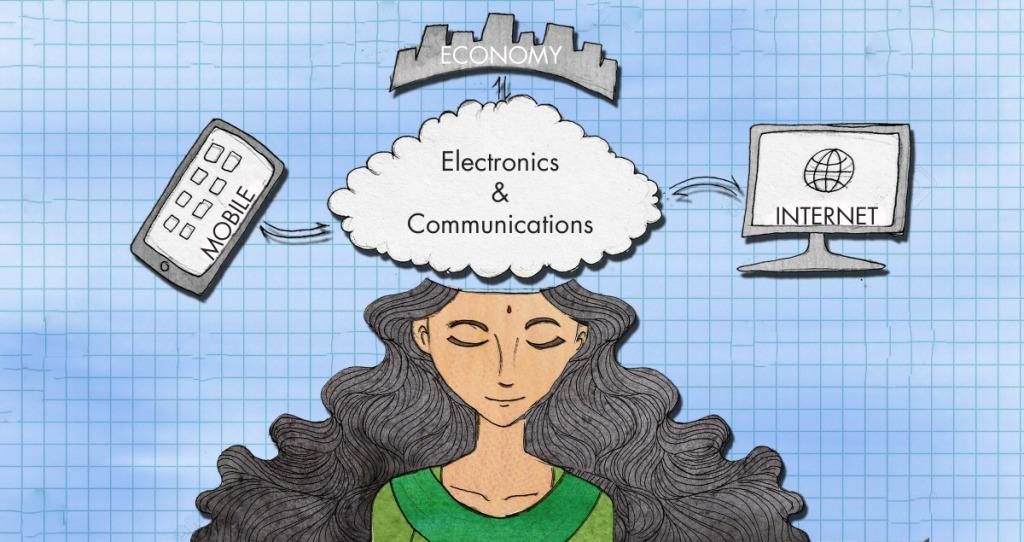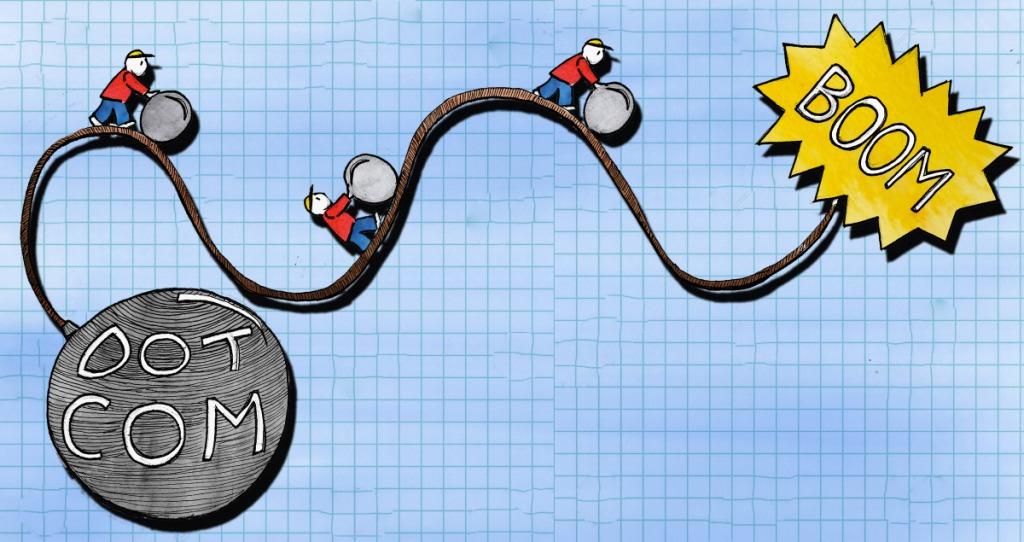San Francisco. Sep 1, 2017: The alarm goes off at 5 am. I realize that I fell asleep while reading my son to bed again. I get up even though dawn hasn’t broken yet, mornings are my favorite time to get a head start on the day.
It has been a year since my husband, Prateek (also from IITB) and 6-year-old son, Abir, moved around the world from Bangalore to San Francisco, to support me in growing my education startup Springboard. My co-founder Gautam and I started the company in July 2013 to solve the skills gap and unemployability problem for India. We quickly realized that online was a more scalable model, and held the promise of larger impact globally. We built Springboard with the global student in mind from day one, with me taking charge of Bangalore and Gautam holding fort in SF. Soon, the business grew to a scale that necessitated my move to SF. We learnt so much about scaling a business, the team and ourselves along the way that I could write a tome on each of them. However, I will save those for future posts or a coffee conversation. For now, let me rewind to how entrepreneurship came about, almost by accident, for me. From the outside, it might look like startups are a result of lifelong passion, or come about in a flash of sweeping inspiration. In my case, it was more of an unglamorous but persistent pursuit for impact. Hopefully this alternate perspective will be interesting for you.
During my years at IIT Bombay (1998-2002), the dot-com boom was at its peak and entrepreneurship was starting to become a part of the conversation on campus. I, for the most part, blissfully ignored it, staying true to the values that were drilled by my family for the first ~20 years of my life – if you are smart and you work hard, you should become an engineer or a doctor. The ones who are not great at studies “do business.” Getting into business, in my family, was equated with running a small neighborhood shop – a kirana store or an STD/PCO/Xerox shop, not so much the large organizations that kept the country’s economy chugging. My parents came from very humble backgrounds – they spent most of their youth working hard and sacrificing all their wishes to support an extended family and saving for the dowry of their two daughters. My dad was an incredibly courageous person who resisted family pressure to “try” for a son the third time, because he wanted to ensure their limited means provide us a bright future, and he treated us no less than sons. I had to live up to their expectations of academic excellence as a path to a good and financially secure career.
Getting into business, in my family, was equated with running a small neighborhood shop – a kirana store or an STD/PCO/Xerox shop, not so much the large organizations that kept the country’s economy chugging.
After IIT, I spent the first 10 years of my career conducting research in grad school, tech startups and research labs. In 2012, I happened to work on a project at IBM Research that needed me to pick up machine learning. Co-incidentally, this was also around the time the first Massive Open Online Courses (MOOC) were coming out. Coursera, Udacity and edX were founded by highly respected educators at Stanford and MIT. I happened to take Stanford’s Andrew Ng’s Machine Learning course on Coursera and it was, no exaggeration, a mindblowing experience. I was halfway around the world in Bangalore, with a full-time job and a one-year-old, spending an hour or two on my commute or at night and after Abir slept. I couldn’t have gone to Stanford for this one course, but the opportunity to learn from the very best experts on my time was very empowering. I started digging deeper to find what was happening in the space. The more I learnt, the more excited I got about the possibilities and making this my life’s work.
Entrepreneurship crossed over from being an over-hyped, me-too trend to a very honorable pursuit for me.
Meanwhile, I had the privilege to be a close witness to Prateek’s entrepreneurial journey at Mygola, which for all its travails, had given him an unparalleled way to create impact and grow personally. It replaced my blind spots with an unglamorous but realistic picture of what it meant to start a company. Entrepreneurship crossed over from being an over-hyped, me-too trend to a very honorable pursuit for me. Hence, when I couldn’t find meaningful ways to further education within IBM or other organizations outside, starting on my own became a natural inclination.

Armed with personal commitment, I braced for the real work to begin. Realized very soon that the search for the ideal co-founder and the business idea is deeply intertwined. I floated the idea of starting something together to friend after friend interested in startups or education. Whenever we could align on the basics, we dove deeper into the specifics and built out hypotheses based on research, and even diverged into ideas far beyond education. However, ideas inevitably fell flat after a while for the lack of business or personal conviction. After a year spent moonlighting on ideas as far ranging as education, healthcare and women’s fashion with potential cofounders, I was almost ready to go back to solving edtech problems in research. This is when, by a pure stroke of chance, a mutual friend introduced me to Gautam. Our backgrounds, skills and networks were complementary, yet our values were shared. We hit it off instantly and despite conventional wisdom on finding cofounders who you know very well, we committed to starting an education company together.
When we started, the only thing we knew was that we wanted to improve education for employability.
When we started, the only thing we knew was that we wanted to improve education for employability. As first time entrepreneurs and outsiders to the education industry, we had many unanswered questions and much naivety about the right problem and the right solution. In fact, it was very early days and the whole online education ecosystem was evolving rapidly. Thankfully, the discourse on lean startups and iterating to the right solution rather than having the right answers from day one prepared us for the reps it would take. Our first product was an education search engine to help people find the best online learning resources. We called ourselves “Sliderule”, in an analogy to the dated but ingenious tool that was once integral to learning and work. It took us multiple years of immersion in the world of education, many user conversations and product experiments for the big vision to crystallize in our heads.
Our big realization was how technology is fueling an accelerated evolution of economies and with it, people’s careers. Our parents’ generation had one job throughout their careers. The average millennial will have 10-15 jobs over the course of their career. At IIT, I studied electronics & communications which were the hottest skills to have at the peak of the semiconductor and telecom revolutions. Today, the growth in these areas has plateaued and internet and mobile, cloud and data are the fuel of the new economy. We can’t be sure what the most important skills will be 5 or 10 years hence, but we can be sure they will be different.
We help people learn new economy skills online with 1-on-1 mentorship from industry experts to advance their careers.
This new economy needs a new approach to education – it is no longer a one-time investment front-loaded at the beginning of one’s career, it’s a lifelong pursuit. When you build an educational experience for this need from scratch in the 21st century, it looks very different from the institutions designed for the industrial revolution. When your students are 30, 40 or 50 year olds, education has to fit people’s lives rather than the other way around. The “teachers” can no longer be different from the “doers”, the credential has to be a work product, not just a piece of paper, and learning has to translate into tangible career outcomes. At Springboard, we are trying to build this University of the Future. We help people learn new economy skills online with 1-on-1 mentorship from industry experts to advance their careers.
We have made a promising start with more than 7000 students from 75+ countries enrolled in our programs and growing exponentially. We’ve been able to build a very capital efficient and profitable multi-million dollar business, and are now doubling down on growth because the opportunity is so huge. When I look back to when we started, I had no glorious dreams of what this small idea could become. It wasn’t a passionate pursuit of “entrepreneurship” for itself, but a grounded approach of finding a problem and solving it, one step after another, that brought us this far. I am proud to have touched many lives as an accidental entrepreneur, you can too.
